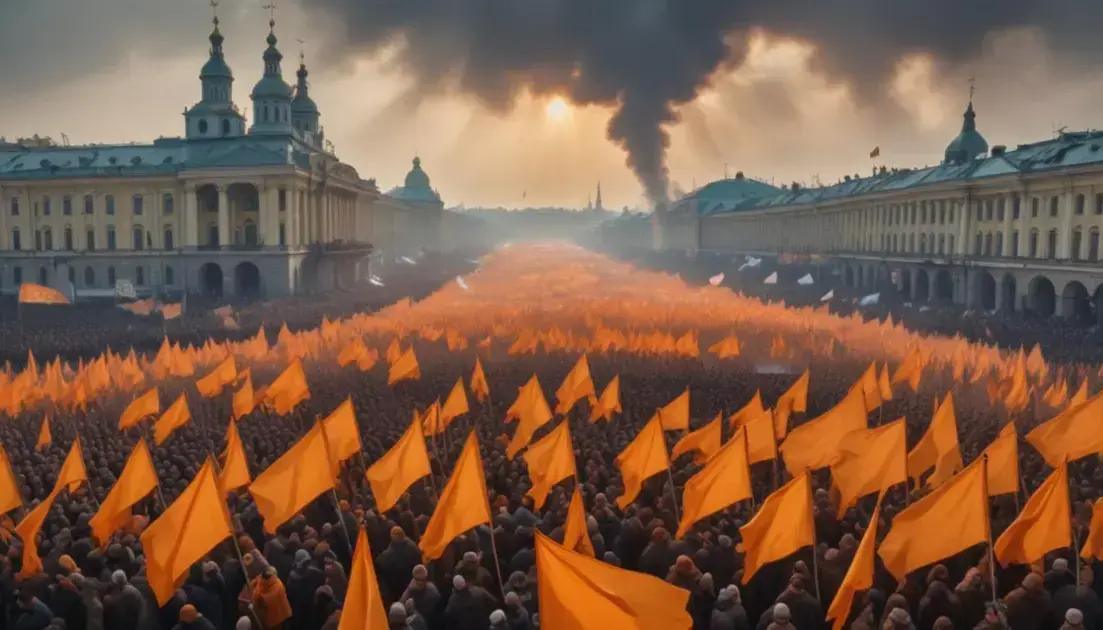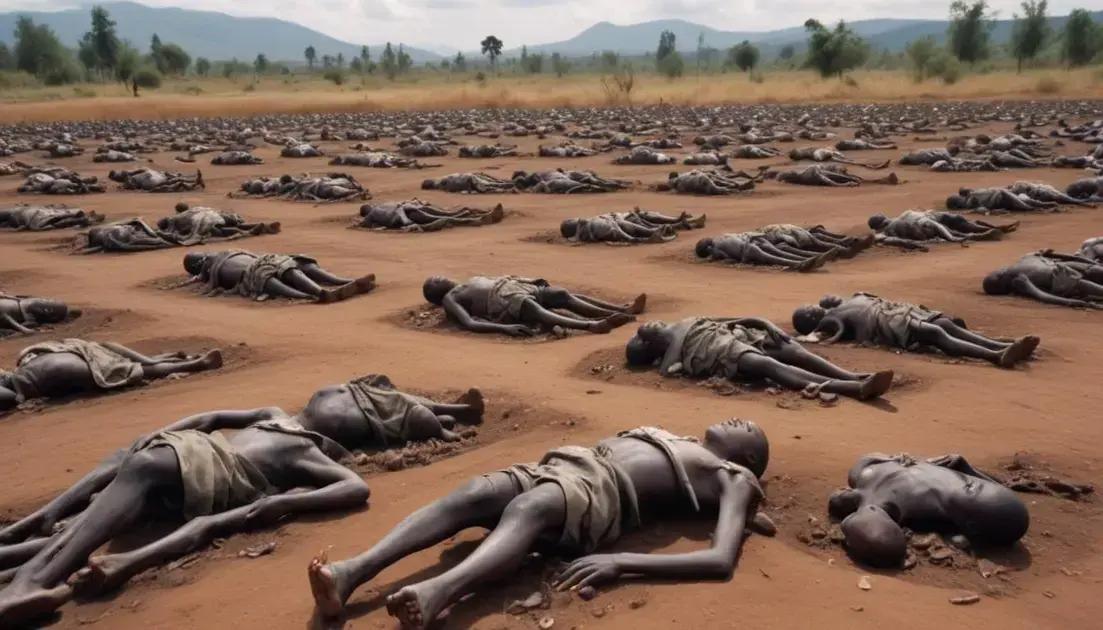
Orange Revolution: Protests and Political Change in Ukraine
The Orange Revolution in Ukraine was a significant movement that began in late 2004, driven by widespread protests against perceived electoral fraud. Citizens demanded fair elections and democratic reforms, leading to increased political engagement and a new leadership shift towards Europe. The international community, especially Western nations, supported these protests, which highlighted global interest in democracy. Meanwhile, the revolution deepened tensions with Russia, impacting Ukraine’s geopolitical landscape. Overall, the Orange Revolution underscored the power of collective action in advocating for justice and change in society.
The **Orange Revolution** was a defining moment for Ukraine, representing a time when citizens boldly stood against electoral fraud, pushing for vital democratic reforms. Are we witnessing such movements today? Dive in!
Historical background of Ukraine’s Orange Revolution
The Orange Revolution took place in Ukraine in late 2004. It was a time when people protested against what they saw as a fraudulent election. Citizens from all walks of life came together. They wanted to ensure fair elections and democracy.
Before the revolution, Ukraine was deeply divided. Many people in the west wanted to move closer to Europe. On the other hand, those in the east favored stronger ties with Russia. This division played a big role in the protests.
The election of Viktor Yanukovych, who was backed by Russia, sparked anger. Many believed that the election results were rigged in his favor. This event triggered massive protests across the country.
Protesters wore orange, the color of their movement. They filled the streets with energy and determination. Their demands were clear: a new election and justice. Young people, families, and even elders participated in the rallies.
The protests lasted for weeks. In January 2005, the Supreme Court of Ukraine ruled that the election results were invalid. This led to new elections, where Viktor Yushchenko won. His victory marked a significant shift in Ukraine’s politics and its future direction.
The Orange Revolution not only changed leadership but also inspired others. It showed that when people unite for a common cause, they can influence change. The spirit of the revolution still resonates today.
Key events during the protests
During the Orange Revolution, several key events defined the protests. The first major event was the announcement of the election results. This took place on November 21, 2004. Many people instantly believed the results were rigged.
On November 22, massive protests began across Ukraine. Thousands of people gathered in Kyiv’s Independence Square. They came together, holding orange flags and chanting for change.
As the days went by, the protests grew larger. People from all walks of life joined in. Families, students, and workers stood together, united by a common cause. They wanted their voices to be heard.
Another key moment came on December 1. Over 500,000 people marched in Kyiv. It was one of the biggest protests in Ukraine’s history. The atmosphere was electric, filled with hope and determination.
On December 8, the protests reached new heights. Activists organized a “March of Millions.” Demonstrators flooded the streets, demanding justice and free elections. The mood was hopeful and passionate.
As tensions grew, international observers arrived. They came to witness the protests firsthand. Their presence added pressure on the government to listen to the people’s demands.
After weeks of protests, on January 1, 2005, the Ukrainian Supreme Court ruled in favor of the opposition. They declared the election results invalid. This decision marked a major victory for the protesters.
The key events during the Orange Revolution showed the power of the people. United, they challenged a government they felt did not represent them. This movement set the stage for change in Ukraine.
Impact on Ukrainian society and politics
The Orange Revolution had a major impact on Ukrainian society and politics. It changed how people thought about democracy. After the protests, many citizens felt more empowered. They believed their voices mattered and could lead to change.
One big change was in political participation. More people started voting and becoming involved in local governments. Citizens realized they could influence decisions that affected their lives. This increased engagement helped create a more active civil society.
The revolution also led to the rise of new political leaders. Viktor Yushchenko, who won the rerun election, became a symbol of hope. His presidency marked a shift towards pro-European policies. Many citizens supported his vision for Ukraine’s future.
However, the aftermath wasn’t without challenges. Political divisions remained strong. Those who supported Yanukovych still held significant power. This continued division sometimes led to conflicts in politics.
In addition, the revolution inspired other post-Soviet states. It showed that peaceful protests could challenge authority. Other countries looked to Ukraine as an example of how citizens could demand change.
The Orange Revolution also affected Ukraine’s relationship with Russia. The government shifted towards the West, seeking closer ties with Europe and NATO. This change caused tension with Russia, which wanted to maintain influence over Ukraine.
Overall, the impact on Ukrainian society and politics was profound. The Orange Revolution sparked a new political awakening. It encouraged citizens to stand up for their rights and aspirations.
International response and its implications
The Orange Revolution caught the attention of the world. Many countries watched closely as events unfolded in Ukraine. The international response was strong and diverse.
Many Western nations openly supported the protesters. They praised their courage and desire for democracy. The United States and European Union issued statements backing the protests. They called for fair elections and political reforms.
International observers were sent to monitor the situation. They documented the protests and reported on any violence. Their presence helped ensure the safety of demonstrators.
In contrast, Russia had a different reaction. The Russian government criticized the protests. They accused Western nations of meddling in Ukraine’s affairs. This response highlighted the tension between Ukraine and Russia during this time.
The reaction of other post-Soviet states was mixed. Some countries saw the Orange Revolution as a model for their own movements. Others feared it could inspire protests at home.
The revolution also raised questions about Ukraine’s future. The West was eager to strengthen ties with Ukraine. They wanted to support its shift away from Russian influence. This created a divide that continued to affect regional politics.
Overall, the international response to the Orange Revolution had significant implications. It showed the world’s support for democracy. However, it also deepened the divide between Ukraine and Russia, shaping future relations.
Conclusion
In conclusion, the Orange Revolution was a pivotal moment for Ukraine. It marked a time when citizens stood up for democracy and their rights. The protests showed how powerful a united voice can be in pushing for change.
The impact on society and politics has been lasting. Many people became more active in their communities and engaged in the democratic process. While challenges remain, the spirit of the revolution helped shape Ukraine’s future.
The international response highlighted the global support for democratic values. However, it also revealed the ongoing tension between Ukraine and Russia. This complex relationship continues to affect Ukraine today.
Overall, the Orange Revolution serves as a reminder of the importance of fighting for justice and equality. It inspires current and future generations to advocate for what they believe in.


